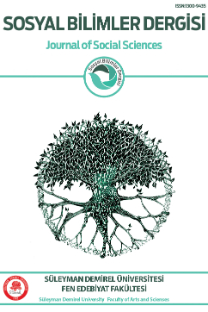Analyzing the Concept of Citizenship and Freedom in Aristotle’s Theory of Constitution
Analyzing the Concept of Citizenship and Freedom in Aristotle’s Theory of Constitution
In the article, my purpose is to examine Aristotle’s conception of citizenship and freedom in his Politics. The thesis explores the distinctive role of Aristotle’s conception of citizenship in ancient Greece. Citizenship is a political identity and is the ultimate end of the individuals in city-state. The reason why we work on Aristotle’s concept of citizenship depends on the values he gives to the identity of its citizens. For Aristotle, the political life is the highest form of human life. His model of the active citizen is the way self-realization himself in political life. To participate in political life, people must have freedom so our study makes possible to examine the citizenship in the context of freedom. The issue of citizenship is difficult because there are many concepts interrelated with each other in Aristotle. We have three important aspects which are the concepts of citizenship, freedom and constitution. Given the subject of freedom as the fundamental, we would have the different models of citizen in different forms of constitution. This study was based primarily on Aristotle Politics. This article concludes with the referents of Aristotle conception of freedom and citizenship in his best form of government in his Politics. There are many academic works on Aristotle’s conception of citizenship but this study may open a window to look his approach to the political freedom of a citizen in ancient Greece.
Keywords:
ancient Greece, Citizenship, freedom, constitution best form of constitution,
___
- Aristotle (1998), Politics, Translated with introduction and notes by Reeve, C.D.C. Cambridge: Hackett Publishing.
- Aristotle (2004), Nicomachean Ethics, Translated by Roger Crisp, New York: Cambridge University Press.
- Derek Heater. (2004), Citizenship: The Civic deal in World History, Politics and Education, Manchester University Press.
- Cherry, Kevin (2009), “The Problem of Polity: Political Participation and Aristotle’s Best Regime”, The Journal of Politics, Vol. 71. No.4, 1406-1421, 1412.
- Jowett, Benjamin (1991), (trans.) Barnes, (ed.) J. The complete Works of Aristotle: The Revised Oxford Translation, Volume 1, Princeton: Princeton University Press, pp. 1986-2129.
- Leydet, Dominique (2014), "Citizenship", The Stanford Encyclopedia of Philosophy (Spring), Edward N. Zalta (ed.), Accessed from: http://plato.stanford.edu/entries/citizenship/ ( 9.10.2014).
- Moulakis, Athanasius. "Civic Humanism", The Stanford Encyclopedia of Philosophy (Winter 2011 Edition), (ed.), Edward N. Zalta. Accessed from: http://plato.stanford.edu/entries/humanism-civic/ (14.08.2014).
- Raaflaub, K (2005), Greek Freedom: The Discovery of Freedom in Ancient Greece. Review by: Ryan Balot. The Classical Review, New Series, Vol. 55, No. 1 (Mar.,), pp. 207-209.
- Scaff, Lawrance A. (1975), Two Concepts of Political Participation, The Western Political Quarterly. Vol. 28, No. 3, 447-462.
- Wallach, John R. (1992), “Contemporary Aristotelianism”, Political Theory, Vol. 20, No. 4. (Nov.), 613-641. StableURL:http://web.viu.ca/livingstd/documents/aristotle%20articles/conte mporary%20aristotelianism.pdf Accessed at 11.11.2014.
- Winthrop, Delba (1975), “Aristotle and Political Responsibility”, Political Theory, Vol. 3, No. 4 (Nov), pp. 406-422.
- ISSN: 1300-9435
- Yayın Aralığı: Yılda 3 Sayı
- Başlangıç: 1995
- Yayıncı: Süleyman Demirel Üniversitesi, Fen-Edebiyat Fakültesi
Sayıdaki Diğer Makaleler
Türkiye’nin SSCB ve ABD ile İlişkileri (1960-1980)
Vefa KURBAN, Giray Saynur DERMAN
Analyzing the Concept of Citizenship and Freedom in Aristotle’s Theory of Constitution
XIV.-XV. Yüzyıl Kaynaklarında Pers ve İskit Kelimesinin Kullanımı
Münire KARABEKİR, Emine TOZLU, Merve Nur MERT ŞENCAN
Özneleşme ve Etkileşim Uzamları
12 Mart Romanları Şafak ve Yıldırım Bölge Kadınlar Koğuşu’nda Devlet ve Birey Ilişkisi
Bir Giriş: Derrida’nın Hayaletlerinden Marx’ın Hayaletleri’ne
Isparta İlçelerindeki Geleneksel Konut Mimarisi
Amerikan İşlevselciliğinin Krizi ve Refleksif Sosyolojinin Olanaklılığı Üzerine
